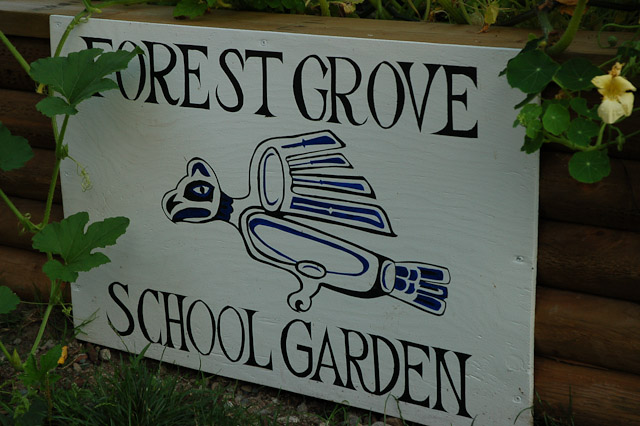Sprouting Chefs: Changing the Way Kids See Food & Themselves
March 28, 2012
Over the past few months, we’ve been hearing a lot about a school garden program called Sprouting Chefs pioneered by Garden Guru Barb McMahon. With the help of many kids, parents and teachers, Barb has created and built the first edible school garden in Burnaby. Her goal? To help connect kids to environmental awareness and sustainability, and to a greater sense of self. She calls it “effortless education” because the garden program so naturally engages children in learning—about growing, planting, where food comes from, and the process that brings the food we eat to our plates. Here, we reach Barb at her home to find out more about Sprouting Chefs, and other gardening programs and camps for kids that she’s spearheading here in BC.
BT: Tell us what inspired you to start Sprouting Chefs.
BM: In 2008, I started with a goal to come into schools and duplicate the Edible Schoolyard Program in Berkeley. The Edible Schoolyard is a one-acre garden located on school grounds that provides an engaging learning environment for kids. Kids spend three days a week in the garden or the kitchen as part of their classes, learning art, math, social studies, etc. For example, a math class might entail planning out the garden: the kids will figure out how many seeds they’ll need to plant to yield x amount of produce. It’s a highly engaging way for children to learn.
BT: How is Sprouting Chefs taking shape in BC?
BM: Sprouting Chefs is essentially a pilot program at the moment, at Forest Grove Elementary in Burnaby, complemented by a series of gardening camps and workshops for children. These happen throughout the Lower Mainland.
BT: Tell us about your growing camps for kids.
In 2009, I started a cooking camp for kids that I now run in various ways, each summer. It encapsulates the key elements of the school program I’m piloting. The camps provide kids with opportunities to plant and grow in the garden, includes field trips to established gardens like UBC Farms, and to food-havens like Whole Foods. We also visit and support gardens associated with existing school garden programs, and do alot of cooking together. There are many opportunities for the kids to learn and see how food travels though from the planting onto our plates.

BT: How’s the school pilot project coming along?
BM: I’ve founded the first edible school project in Burnaby, and I’m in the process of developing a program around this pilot project, which I hope to duplicate in other schools. I frequently get asked for resources and information from others seeking to launch similar programs, and I’d like to be able to hand them a curriculum, but at the moment, I share some resources, and provide workshops as well.
BT: What are some of the challenges you’re facing launching the School program?
BM: One challenge is time. The pilot program still needs another year until it’s developed to the point that I can share a curriculum. There are still barriers I’m trying to get through, so that in the future, those barriers won’t be there. For example, policies for school gardening vary from school to school and district to district. For example, the Vancouver School Food Garden Policy has been established in Vancouver, while Burnaby is still looking at available models and the successes of other districts for direction in this area.
BT: Are you open to working with daycares, schools or other community groups interested in gardening programs?
BM: Yes, definitely. If people want to learn more about Sprouting Chefs, I offer workshops and camps throughout the year. I also take my program and travel to schools and daycares. I’m totally open to working with new partners or community groups, and welcome inquiries!
BT: And finally, where does all your passion come from?
BM: I really believe that gardening is an empowering way to connect kids to each other, to nature and to themselves. I see it every day: gardening gives kids a voice of their own, to offer ideas and to participate. By giving a child a role to play in the garden, it says to a child “you matter, you’re important.” As a result, they feel, “that’s ours.” The kids take ownership and responsibility.
To me, gardens are gateways. They are platforms to other opportunities to connect kids to food awareness and educate them about sustainability. Gardens help to change the way kids view food. For example, some students in Burnaby are lobbying to change the food offered in their cafeteria. They are trying to get rid of their schools catering contract and instead to bring in more garden fresh food.
When you start simple, with the idea of planting and growing, it opens the way for lots of other great ideas to naturally sprout!
Barb, thanks so much. It’s obvious that Sprouting Chefs is indeed a labour of love. To any parents, teachers, principals or children interested in Sprouting Chefs, you can visit www.sproutingchefs.com and send Barb an email.

















(0) Comments